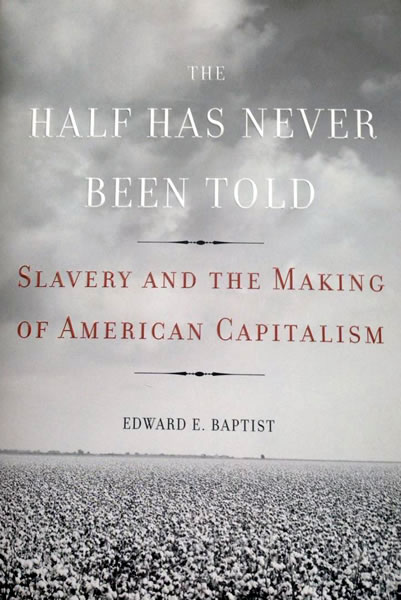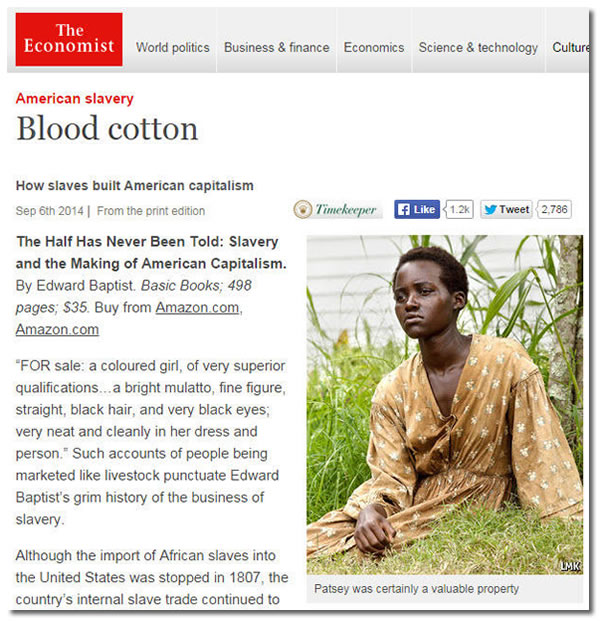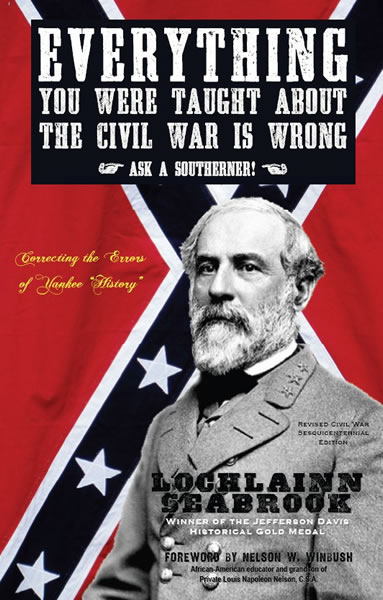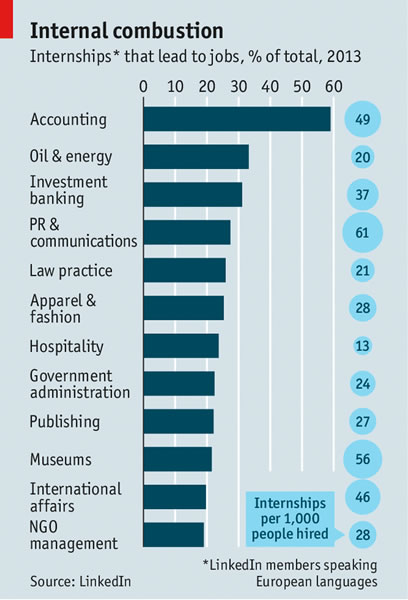The review and its withdrawal
You can generally count on The Economist to provide an amusing, and sometimes educational read, even when they’re trying a little too hard to be glib and clever-clever in that Oxbridge upper class twit kind of way. However, there are exceptions to every situation, and such an exception reared its ugly head Thursday night online and in print in the September 6th edition. That’s when they published an uncredited review of Cornell history professor Edward Baptist’s book, The Half Has Never Been Told: Slavery and the Making of American Capitalism.
Here’s a screen capture of this execrable article, complete with a photo of Lupita Nyong’o playing her role of “Patsey” from 12 Years a Slave — who was both a slave and a concubine to her white master — with the caption “Patsey was certainly a valuable property”:
The Economist’s anonymous reviewer or reviewers hated the book, their complaint being that it cast slave owners in a bad light. The two final paragraphs of their writeup serve as both a summary of their opinion and as an example of bigoted sophistry that will be cited in writing and ethics classes for decades to come:
Mr Baptist cites the testimony of a few slaves to support his view that these rises in productivity were achieved by pickers being driven to work ever harder by a system of “calibrated pain”. The complication here was noted by Hugh Thomas in 1997 in his definitive history, “The Slave Trade”; an historian cannot know whether these few spokesmen adequately speak for all.
Another unexamined factor may also have contributed to rises in productivity. Slaves were valuable property, and much harder and, thanks to the decline in supply from Africa, costlier to replace than, say, the Irish peasants that the iron-masters imported into south Wales in the 19th century. Slave owners surely had a vested interest in keeping their “hands” ever fitter and stronger to pick more cotton. Some of the rise in productivity could have come from better treatment. Unlike Mr Thomas, Mr Baptist has not written an objective history of slavery. Almost all the blacks in his book are victims, almost all the whites villains. This is not history; it is advocacy.
The article is bad enough in and of itself. At a time when America is still feeling the after-effects of its slaver history, from the continued activities of the Tea Party to Ferguson, publishing it is…well…

Needless to say, all their equivocating — which boils down to “Of course people who were treated as sub-human farm equipment because of the color of their skin were going to be biased against slavery!” and “Sure, they were whipped, but not so badly that they couldn’t produce higher cotton yields!” — led to complaints aplenty from the still-sizable non-Klan portion of the internet, and The Economist withdrew the review. To their credit and in “the interests of transparency”, they left the text online (but thankfully removed the photo of Patsey along with that terrible, terrible caption), along with doing some editorial distancing:
There has been widespread criticism of this, and rightly so. Slavery was an evil system, in which the great majority of victims were blacks, and the great majority of whites involved in slavery were willing participants and beneficiaries of that evil.
The #economistbookreviews hashtag is born

In the age of social media, you have more options than writing a letter to the editor (although I’d still recommend doing so, just to make sure that they get the message), and thanks to this fact, the #economistbookreviews hashtag was born. On Twitter, it accompanied imagined book reviews written with The Economist’s ruthlessly amoral sensibilities:
“Mr. Douglass never considers how much teaching slaves to read impacts plantation productuvity” #economistbookreviews pic.twitter.com/21KsubpH9l
— Virally Suppressed (@SuppressThis) September 5, 2014
#economistbookreviews “At no point does the Diary of Anne Frank mention the daily tribulations of ordinary hardworking Wehrmacht.”
— Paul Moloney (@oceanclub) September 4, 2014
Fails to explore the valuable work-experience opportunities offered by N. Korean prison camps. #economistbookreviews pic.twitter.com/J4mIAZVCx4
— La Chavalina (@LaChavalina) September 5, 2014
Samantha Power’s dissection of the Kurdish genocide would benefit from more of Saddam’s point of view #economistbookreviews
— Paul K. Adler (@padlerman) September 4, 2014
Guards that killed Tom Robinson in To Kill A Mockingbird show merits of Stand Your Ground laws #economistbookreviews pic.twitter.com/KcURf8LOiw
— Virally Suppressed (@SuppressThis) September 5, 2014
Nowhere in Mr. Dickens’ account does he acknowledge the proprietor’s generosity in providing orphans with factory work #EconomistBookReviews
— Katje (@silentkpants) September 4, 2014
And seriously, Mrs. Trunchbull wasn’t all that bad… #economistbookreviews pic.twitter.com/8oHUQ7QbMO
— Bruce Spadaccini (@BSpadaccini11) September 5, 2014
Some observations

These days, many people use the internet to inform their purchase decision-making, and it’s often the reviews that help tip the scales in the buy/don’t buy decision. If it was The Economists’ reviewers intent to kill the sales of this book for having the temerity to suggest some white people’s ancestors treated black people like beasts of burden, it’s likely backfired. The review has been covered in the Washington Post’s blog, Talking Points Memo, Slate (who give some advice, including the obvious “Don’t use movie stills in a review of a book about slavery”), The New Statesman, Poynter, Business Insider, and even Gawker.

Here’s my theory: as a magazine, The Economist is perhaps the most articulate, erudite defender of the neoliberal capitalist order. They are too smart to waste their time as Laffer curve snake-oil salesmen or crude economic nationalist (cough cough, Wall Street Journal, cough cough), but nevertheless, the main commitment of their reporting and their commentary is to defend late modern global capitalism as an economic and moral good. Think Davos, not the Tea Party. And that’s why they don’t like Baptist’s book: it demonstrates unequivocally that modern capitalism was born in blood. Let me say that again: whatever else you might say about capitalism, it took on its characteristic modern forms of capital accumulation and labor “management” in the context of American slavery. For a group of journalists with a deep, almost unarticulated commitment to modern capitalism’s fundamental benevolence, this is an uncomfortable truth indeed.
Hence the critical review, and the particular nature of The Economist‘s criticisms. The book has to be wrong, because if it isn’t, then capitalism isn’t an inherently moral economic system. And it has to be wrong specifically in its description of how capitalism exploits labor. The review has to hold out hope that slavery provided incentives for slaveowners to treat their slaves better, that “the rise in productivity could have come from better treatment,” because otherwise, the book gets uncomfortably to the reality that modern capitalism gets its increases in productivity at the expense of its workers, too. That last point is pretty obvious to anyone who’s been paying attention since 2008 (well, and since the 1970s), but it’s one that The Economist’s ideological commitments can’t allow it to confront. And that’s why we got such an ugly and weird review of Baptist’s book … and why they withdrew it, with such apparent bewilderment.

A blogger going by the nom de plume of Pseudoerasmus Boukephalos, whose primary interests are “economic growth, history & development, plus the related issues of political and social modernisation” also read the article and took a tack removed from any of the moral issues involved. He decided to challenge the book’s thesis that it was the judicious and careful use of beatings that boosted the cotton yield:
The Economist‘s elf was lazily speculating, a priori, about what could have been the determinants of efficiency in southern cotton production. It’s possible the reviewer is familiar with some of the arguments and debates surrounding Time on the Cross, one of whose many controversial arguments was that slaves were becoming ever more valuable property in the antebellum American South and were therefore better treated than commonly supposed. But I doubt that literature is known to the reviewer, because then he would have been familiar with recent research on the sources of increased efficiency of cotton agriculture in 1800-60.
He produces charts that show a 2.3% annum growth in the cotton yield for 60 years straight and argues that you can’t get this kind of boost except through technological innovation. Improvements in cotton harvesting tools along with the introduction of new strains of cotton plant that produced more white fluffy stuff and were taller, and thus easier to pick.
Not a parody, but an actual book. Click to see its Amazon page.
If you’ve read this far, go and read this essay: In Defense of Revisionism. Here’s an excerpt:
There was a time, for example, when historians didn’t worry much about the slave trade and the emergence of an economy based on forced labor. Historians likened the plantation to a “school,” and emancipated people as children let out of class too soon. Only slightly more than a half-century ago, historians began to “revise” that narrative, examining sources previously ignored or unseen, informed by new ideas about race and human agency. More recently, scholars have revised 19th-century images of the “vanishing Indian,” a wildly inaccurate narrative that lives on in public monuments and popular lore, and has implications for public policy.
This essential process of reconsideration and re-evaluation takes place in all disciplines; imagine a diagnosis from a physician who does not read “revisionist” medical research.
Revisionism is necessary — and it generates controversy, especially when new scholarship finds its way into classrooms…
In the same Economist issue as the review is an article on internship which has the subtitle “Temporary, unregulated and often unpaid, the internship has become the route to professional work”. I sense a pattern here.
Thankfully, none of their writers have used this to back a retort along the lines of “See? We know what toiling without a wage is like!”

We shouldn’t let The Economist off the hook so easily, but we should also remember the times when they do listen to the better angels of their nature (and yes, despite my foreign, non-American schooling, I know that’s a Lincoln quote). Last year, in honor of the 50th anniversary of Martin Luther King’s “I Have a Dream” speech, they published an essay that was considerably higher-minded, and which ended with this paragraph:
America’s shameful past is fading. Skin colour is nothing like the barrier it once was. But the “pursuit of happiness” to which King referred is never easy, and never ends.




15 replies on “The “slavery wasn’t THAT bad!” book review in The Economist, the hashtag that came from it, and some observations”
“He decided to challenge the review’s thesis that it was the judicious and careful use of beatings that boosted the cotton yield”
My understanding is, that is Baptist‘s thesis. I was challenging Baptist’s thesis, as represented in the review. I’ll read it when it comes out on Kindle but right now I’m limited to what the review and the book description say. So my blogpost stuck very closely to the issue of slave productivity over time.
The Economist reviewer preferred to speculate that the scarcity of slaves following the end of the transatlantic trade made them more valuable as capital assets, and better treatment might have led to better slave productivity.
Both views hold as premises that the dramatic gains in slave productivity had something to do with the work effort of slaves. But as I argue in the blogpost that just CANNOT be.
And yes, that was the intent of my statement: that your post challenged the thesis of the book’s author, and not the author(s) of the review. That was a case of my typing not keeping with my thinking. I’ve since made the correction.
FWIW, I don’t know if I’ve ever noticed a straight photo caption in the economist–at least the ones I remember were dry and/or sarcastic. I’d bet money that the caption was a failed attempt to criticize the article’s point of view that would reduce enslaved people to only economic units.
To clarify: even if I’m right, the caption is a spectacular failure.
Eric: I agree — The Economist always goes for the snark in their comments, and in this case, it comment fell into the second category in the Golden Rule of Comedy: “If it bends, it’s comedy; if it breaks, it isn’t.”
It’s a bit if a stretch to refer to slavery as capitalism, an old world throwback that our country ended upon fighting a civil war, especially since it also represented the actually industrial revolution mated North pitted against a rural South. If capitalism is understood as freedom of association and freedom of choice in the market, no, slavery is ancient anti-capitalism, a cousin of communist style central planning of careers and prices and income.
It should also be mentioned that the temperamentally anti-capitalist Democratic Party was for generations after the Civil War the official party of racism and Jim Crow laws, opposed by highly libertarian Republicans of the past, and today Democrats remain race obsessed so badly that they still are racist against Asians dominating college admissions due to their high intelligence. Democrats still destroy black careers with their affirmative action admissions policies that put so many black college drop outs in lifelong debt since they were actively recruited by colleges they couldn’t compete well in.
This hatred of the Tea Party is just silly as far as implying it’s racist, so incalkaorrect on the face of it to not just represent slander but nearly religious cultism in favor of a nanny state that is slowly creeping towards outright Stalinism in how Democrats now call for rational climate alarm skepticism to be banned and even made illegal (as writer David Appell quoted Michael Mann suggesting) and how due process rights on campus for the heinous crime of rape is now being dictated by the government.
You could just as sincerely claim that it was capitalism itself, a movement wed to the industrial revolution that freed the slaves, as the capitalists conquered and humiliated the agronomists. The Economist is biased but so is the opposing activist side you present so strongly against it. I make products for a living and do not appreciate a Gibson Guitar raiding administration that says “You didn’t build that” while using long extinguished slavery to make children hate me for being organized as a business, as most artisans are indeed required to be. If I support the Tea Party to end such raids and envy fueled hateful policies, you trying to tarnish me with racism only energizes me more, to work for a smaller government, one that will no longer allow your seathing anger to hurt my business which really as an artisan is my whole life.
All I see here is a guilt by association word game, trying to smear the simple policy of free markets with now nearly ancient slavery, something nobody in my own family has anything to do with, for they worked their own damn Northern farms. If the goofballs at the Economist or some Bible thumping conservative asserts nonsense, you don’t get to fairly use that to smear normal independent workers who very much are building that, who are becoming future capitalists as their one man shop eventually expands into being a corporation. Trying to do so makes you quite ridiculous as far as non-fanatics are concerned, and it’s telling that I ran into your essay via the now far left wing BoingBoing blog, that is still pushing the now obvious global warming scam each and every week of the year. That issue alone , the backlash against it, dooms the contemporary left as becoming the laughing stock of history.
-=NikFromNYC=-, Ph.D. in chemistry (Columbia/Harvard), formerly -=Xenon=- who founded the Macintosh Cryptography Interface Project, a 1993 era GUI for the hard encryption program PGP, back when Congress tried to dictate hardware backdoor Clipper Chips in all PCs, unsuccessfully.
Some time back publications like the WSJ and The Economist provided good business coverage. If nothing else, the business community would take action based on business journalism, so if the journalism was bad, the publication would be forced out of business. The editorials were always ridiculous. As the joke went: no one ever went broke shorting the WSJ editorial page.
Nowadays, the business class is heavily subsidized, so there is no need for them to make good business decisions. The editorial page nonsense has taken over their business coverage. Book reviews like this are just the tip of the iceberg. It is hard to find useful, actionable business news in the WSJ or The Economist these days as their ideological filters make their reporting useless.
NikFromNYC: Mackintosh’s assertion was that the reviewers at The Economist saw the book as an attack on capitalism, and in a blind rush to defend it, hit some seriously racist notes. I myself agree with you that the south was mis-applying capitalism and the north had got it right by taking technological innovation and bringing it to market. I’ll have to agree to disagree with you about the Tea Party — there’s evidence aplenty that they’re really the Confederate Party in terribly thin disguise — but hey, one of the nice things about this place is that we’ve got the freedom to have and share such opinions, and the maturity to discuss our differences like grown-ups.
You can try to associate the Tea Party with the Democratic Party of the Confederate States, but it does invoke the laugh test rather unfavorably, being about as Orwellian as can be. Sure, the Democrats switched sides but that doesn’t have a mirror image in Republicans who through the Tea Party have remained staunchly libertarian. It is a confusing bit of history for me still though, since Democratic racism was an open secret until I was no longer a student. The concealment of this past in favor of implicating Republicans with the sins of their own legacy alone explains liberal white guilt, for Democrats were the Southern slave owners, eventually physically conquered and then politically defeated by libertarian Republicans. Joe Biden exclaiming that the Tea Party of constitution supporters would “put you all back in chains“ exposes the shrill lies and slander at work against those of us who want and end to a bloated government, as if that’s racict. It’s similar to left wing eugenics being covered up by the big lie technique of referring to NAZIs as “right wing” while ignoring the party name itself (National Socialist Workers Party) and Hitlers denouncement of capitalism.
The essay you reference states: “The presiding spirit of this neo-secessionism is a resistance to majority rule.”
Exactly! It is about constitutional limits on mob rule, based on highly refined basic principles. But that’s not racist at all. It’s just support of a constitutional republic over ruinous direct democracy in which inflamed coddled minorities can vote themselves racist affirmative action and benefits that destroy initiative. The Tea Party simply threatens to stop treating blacks as special needs children and treat them respectfully instead.
The essay adds: “Today, ObamaCare cannot be accepted. No matter that it was passed by Congress, signed by the President, found constitutional by the Supreme Court, and ratified by the people when they re-elected President Obama.”
Yet his reelection was achieved by one of the biggest lies told in American history, about Obamacare, no different from Australia’s prime minister lying about no
carbon tax under her administration that then turned Australia conservative. Obama’s administration also used the full force if the IRS to repress the Tea Party in a way Nixon was impeached for, so using his narrow re-election as a mandate is Stalinist in outlook.
Basing arguments on ignoring the prime facts is a losing strategy, I’m afraid you’ll find out soon enough.
@NickFromNYC wrote:
“If capitalism is understood as freedom of association and freedom of choice in the market…”
That’s a horrendously massive “if” my friend. Yes, many mainstream economists love to promote the myth that capitalists and workers enjoy equal power relations with freedom of choice blah blah blah, but the reality is that capitalists always have almost all of the power while wage earners are at the mercy of forces well beyond their ability to control. The vast majority of wage earners do not have the luxury to pick and choose who they wish to work for and their relation to the capitalist employer in most cases is that of beggar at the table hoping for scraps. Yes, the worker’s body is not owned outright but given the lack of work options the worker can be commanded to perform acts that endanger and degrade with little choice but to comply.
Additionally, the fact is that while slavery was an incredibly dehumanizing and evil institution does not mean it is incompatible with capitalism. The wager earner is a different economic arrangement of course, but the slave can replace the wage earner in any capitalist enterprise as easily as turning the firm’s parking lot into a collection of shacks.
NikFromNYC: I agree with your closing sentence, for very different reasons.
[…] article, The Economist defends America’s enslavement of Africans, which referred them to my article on the matter. Thanks, […]
[…] di proteste, l’Economist ritratta la recensione di The Half Has Never Been Told: Slavery and the Making […]
I bet there are very few crows in NYC as NickFromNYC’s straw men are quite plentiful -the Democrats being anti capitalist being the biggest one. Just because Democrats think capitalists ought to consider the effect of their actions on society at large -say like not trashing the economy by gambling everyone’s money away and asking for bonuses for doing so – is not anti capitalist. In fact responsible capitalism is a good thing and better than any of the alternatives.
The difference is that Democrats understand that citizens have every right to spank capitalists’ asses when they get out of hand and prevent them from doing dangerous things in the first place. Greed can and does turn otherwise smart CEO types into impetuous bullies and it has been this way since before recorded history.
Virtually every Democrat I know is fine with capitalism but realizes that the invisible hand is not inherently benevolent; it requires a bit of citizen proscribed discipline to function properly. And yeah, we Dems have our own nut cases -we just don’t let ’em drive our bus.
ISTR that the Yes Men sent someone to a meeting of neoliberals to propose the idea that businesses should own their workers so as to encourage investment in them. Nobody responded with shock or disgust.
Pseudoerasmus, please don’t read anything on the Amazon Swindle. That attacks your freedom too. See http://stallman.org/ebooks.pdf.
[…] over at the Economist. I know, I can hear some of you grinding your teeth especially after #Economistbookreviews, but what do you want, I played pick up basketball in college with Tucker Max. Guy had handles and a […]